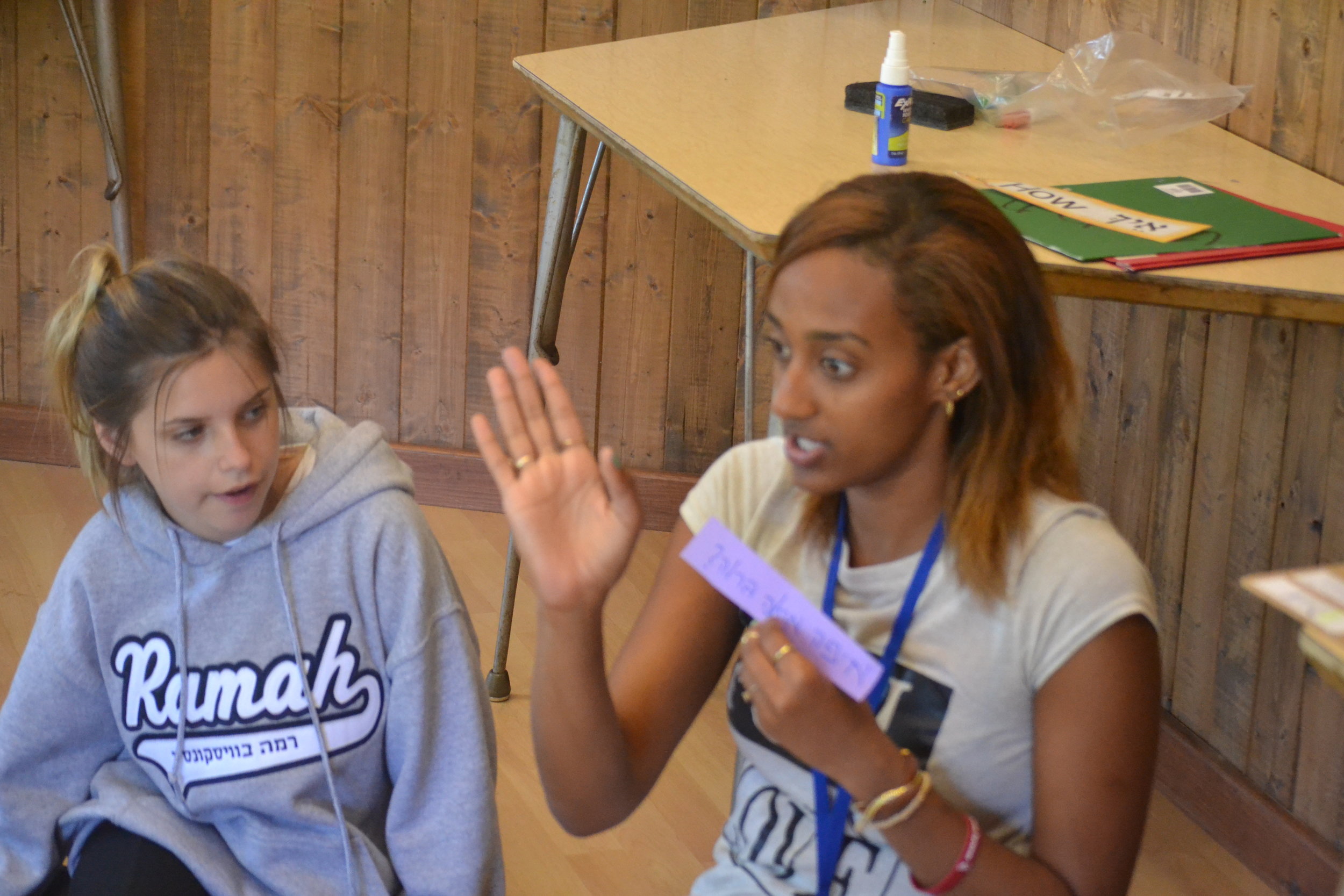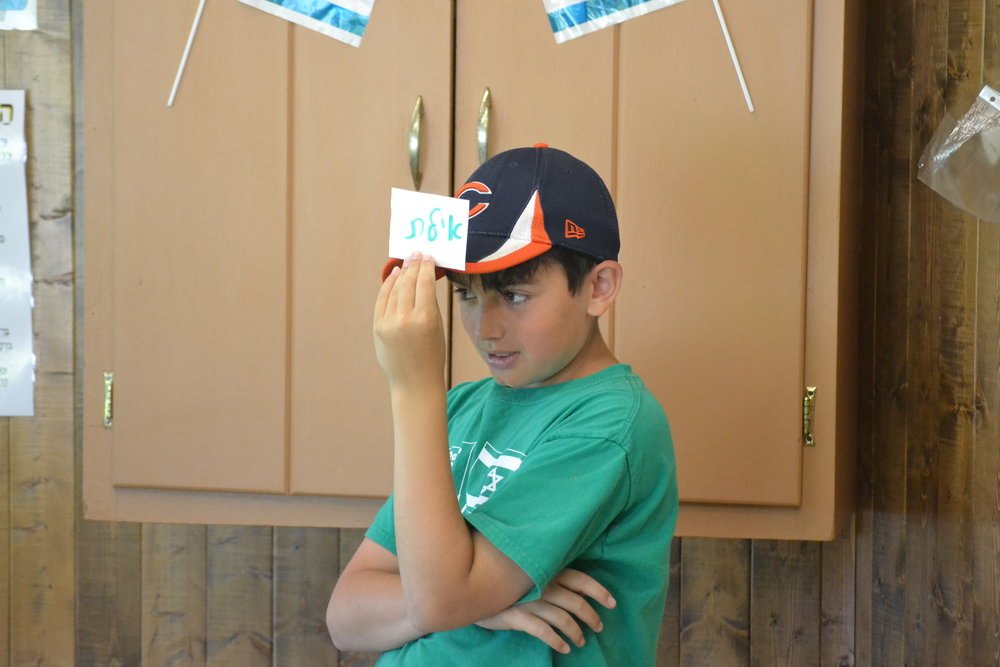By Joseph Eskin, Jewish Studies Rosh
 The first few weeks of the summer have been filled with amazing opportunities for campers to learn Ivrit (Hebrew) and to benefit from Jewish texts. The times of the day dedicated to formal learning help to connect the everyday experiences of each camper – tefillah (prayer), meals, sports, and everything in between – to the underlying reality of living in a Jewish space and a Jewish community. The themes, ideas, and vocabulary that campers explore in classes add significant meaning to their daily routine and to their overall summer experience. Here are some examples of what has been happening so far this summer:
The first few weeks of the summer have been filled with amazing opportunities for campers to learn Ivrit (Hebrew) and to benefit from Jewish texts. The times of the day dedicated to formal learning help to connect the everyday experiences of each camper – tefillah (prayer), meals, sports, and everything in between – to the underlying reality of living in a Jewish space and a Jewish community. The themes, ideas, and vocabulary that campers explore in classes add significant meaning to their daily routine and to their overall summer experience. Here are some examples of what has been happening so far this summer:
- Kochavim: Several students came to camp not knowing the Alef-Bet (the Hebrew alphabet). Over the course of their two weeks in Ivrit, every single one learned the entire Alef-Bet. By their last day in camp, there were still two letters they had not learned, so their teacher, Maayan, sat with them and helped them learn the final letters they needed. We feel an educational obligation to send every child home with a basic grasp of the Hebrew language, and we feel that these specific campers left camp with a positive experiences because they themselves said that they want to continue learning Ivrit.
- Garinim: In Yahadut (Jewish studies), the Garinim have focused on b’rachot, blessings for various foods and occasions. As a final activity this week, the Garinim are baking challot in the Chadar Ochel (dining hall) and discussing the b’rachot connected to them – connecting the words we say to the actions we do.
- Solelim: In Yahadut, the Solelim have been studying Pirkei Avot, the section of the Mishna which includes words of wisdom and advice from generations of rabbis. As a culminating activity, the campers are creating their own Pirkei Ramah, a collection of insights and experiences from “generations” of Ramahniks. As part of this project, the campers are interviewing veterans staff members in camp, people who grew up here as campers, who came as staff members, and have spent anywhere from 5-25 years at camp. Some of the interviewees even have children who have come through as campers and staff members, helping Solelim campers see the concept of “L’dor Va’dor” (generation to generation )in action.
- Machon: Campers in Yisrael’s class focused on nature, ethics, and spirituality have engaged with the material in a variety of ways. This week, they played out a scenario at the United Nations which concerned a deadly disease which originated in the forests of South America and had global consequences. Representing different countries and international organizations, they sought a resolution which balanced economic needs, social concerns, and environmental conservation. The entire time, a panel of expert guests – doctors, ethicists, and environmentalists – listened, gave feedback, and reflected. The guests were impressed with the preparation and insight of the campers.
 Ivrit: Each week, the Ivrit classes focus on a different topic which is then adapted to each age level and Hebrew level. This week, the topic was food, with a special focus on Israeli cuisine. Campers had the chance to conduct taste tests (some of them blindfolded!), tried out Israeli menus, and wrote menus of their own.
Ivrit: Each week, the Ivrit classes focus on a different topic which is then adapted to each age level and Hebrew level. This week, the topic was food, with a special focus on Israeli cuisine. Campers had the chance to conduct taste tests (some of them blindfolded!), tried out Israeli menus, and wrote menus of their own.- Bogrim and Machon: We continue to give campers in the older aidot (age divisions) the opportunity to experience Israeli television through watching the Israeli series Srugim (Bogrim) and Shtiesel (Machon). These award-winning dramas depict different social groups within Israeli society and the interactions, connections, and complexities between them. Shtiesel is a brand new series from the last year and a half which continues to air new episodes, The campers really enjoy these classes, especially having the chance to connect with Israeli society and culture.
- Tikvah and Atzmayim: Campers in Tikvah and participants in Atzmayim are included in Ivrit and Yahadut experiences at Ramah. Many Tikvah campers are placed in Bogrim and Machon classes for Ivrit or Yahadut. Additionally, campers in Tikvah have the chance to spend a portion of Shabbat afternoon playing Hebrew games and learning additional Ivrit. Each week, Atzmayim enjoys a Ivrit class and a Yahadut class created specially for young adults with topics that interest them. Several Tikvah campers are in the Tikvah Text class, which has focused this summer on the book of Exodus. Campers have used music, drawing, discussions, and interactive games to explore the characters and themes of the Exodus story.
We look forward to continued fun and learning over the rest of the summer!



